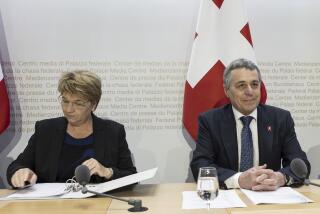U.S.-Russian Summit Shifted to Moscow
- Share via
MOSCOW — This weekend’s Russian-U.S. summit, originally set for the Black Sea resort of Sochi, will be in Moscow instead, officials announced Thursday. The White House said that Russian President Boris N. Yeltsin had requested the change, citing bad weather in Sochi.
The meeting, where Yeltsin and President Bush will sign a historic treaty to cut the Russian and American nuclear arsenals by two-thirds, will now occur amid Moscow’s snowdrifts and frost, with temperatures expected to hover at 5 degrees below zero.
Yeltsin, who has recently been recovering from a cold and even said Wednesday that he had been hospitalized for it, had apparently looked forward to balmier conditions in Sochi, known for its palms and pleasant summer beaches. His cold had already led him to cancel a summit of the Commonwealth of Independent States, planned for last week.
But Russian weather services reported a nasty, freezing rain in Sochi, with temperatures hovering at freezing; forecasts were for more of the same for the weekend. Heavy snows were reported in nearby Abkhazia.
Flying into Moscow’s deep winter will mean a sharp climate change for Bush, who will head here directly from the swelter of Somalia, where he has been visiting U.S. troops.
But it will bring other advantages. Russian and American officials had expressed deep doubts about whether Sochi could provide the security and other arrangements for as large an event as a summit.
Concerns also remained about ethnic fighting in Abkhazia, only 60 miles away from Sochi.
With the summit in Moscow, Yeltsin will have all the Kremlin’s resources at hand, and the American delegation will have its pick of Western-standard hotels and the use of U.S. Embassy facilities.
White House spokesman Marlin Fitzwater announced the venue change aboard the assault ship Tripoli, where Bush spent Thursday night. He said the basic schedule of the summit will otherwise not change.
Under the proposed arms control treaty, known as START II, Russia and the United States would cut their total strategic nuclear arsenals to 3,000 and 3,500 warheads respectively by the beginning of the next decade. The treaty also would do away with land-based, intercontinental missiles armed with multiple warheads, considered the most destabililizing of nuclear arms. Bush has said that, besides the arms treaty, he and Yeltsin will discuss a range of bilateral and regional topics.
More to Read
Sign up for Essential California
The most important California stories and recommendations in your inbox every morning.
You may occasionally receive promotional content from the Los Angeles Times.










